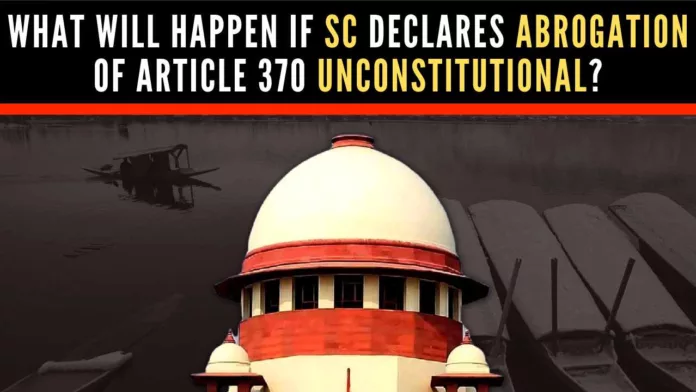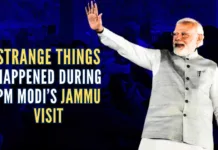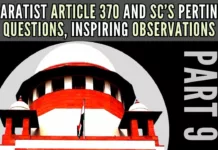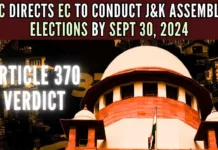
What if…?
On July 11, 2023, the Supreme Court said it will commence day-to-day hearing from August 2 on a batch of petitions challenging the abrogation of Article 370 of the constitution that bestowed special status on the erstwhile State of Jammu and Kashmir (J&K). Besides, a five-judge constitution bench headed by Chief Justice D Y Chandrachud, which passed several procedural directions, fixed July 27 as the deadline for filing of written submissions and convenience compilations by different parties. Not just this. The bench, also comprising Justices Sanjay Kishan Kaul, Sanjiv Khanna, BR Gavai, and Surya Kant said that hearing on the clutch of petitions will be held on a day-to-day basis from August 2, except on Mondays and Fridays, which are days for hearing miscellaneous matters in the apex court, and also said that Centre’s affidavit filed on July 10, 2023, which said J&K witnessed development on an unprecedented scale after the abrogation of Article 370 and on the prevailing conditions in the Union Territory, will have no bearing on the constitutional issue to be adjudicated by the five-judge bench.
Earlier, in June 2020, a five-judge constitution bench, headed by CJI, N V Ramana, had observed that the apex court “can put the clock back”.
What will happen if the SC declares the August 5-6, 2019 historic reform scheme — abrogation of seditious Article 370 unconstitutional and discriminatory Article 35A and creation of Union Territory of J&K and Union Territory of Ladakh –, which was duly passed by the Parliament, the supreme law-making body, unconstitutional and illegal?
The J&K Constitution of 1957, which created the Islamic Republic of J&K within the Indian Republic, will again come into force. The constitutional authorities will again hoist J&K’s red and white flag on buildings housing their offices and their official vehicles. All the Central laws, which were introduced in the region after August 6, 2019, will be declared legally invalid. The obnoxious J&K laws, which were repealed/ amended, will again come into force.
The black law passed by Sheikh Abdullah, which was known as The J&K Grant of Permit for Resettlement in (or Permanent Return to) the State Act, 1982, will be revived. It enabled Muslims of Jammu province and their descendants, who migrated to Pakistan between March 1, 1947, and May 14, 1954, to return to India and resettle in Jammu. It was one of the 153 J&K laws and Governors’ Acts, which was scrapped by the Narendra Modi government.
The practice of the J&K Governor, J&K High Court judges, and others taking oath in the name of the J&K Constitution and the Constitution of India will be restarted. The practice of darbar move from Jammu to Srinagar during summer and from Kashmir to Jammu during winter would again become the order of the day. The result would be that the exchequer would suffer a loss to the tune of Rs.200 crore every year and the Kashmiri imperialists will again – apart from looting Jammu and its natural resources, contract, and jobs, to mention only a few, and vitiating its socio-religious and political life — unleash demographic invasion on Jammu to finish their unfinished agenda.
The practice of observing a state holiday on July 13, the so-called “martyrs’ day” (read anti-Dogra day), and a state holiday on the birthday (December 5) of Sheikh Abdullah (separatist of separatists), which was discarded after August 2019, will again be restarted. And the state holidays on the accession day (October 26) and the birthday of Maharaja Hari Singh (September 23) would be cancelled to taunt and humiliate the Dogras of Jammu and New Delhi.
Ladakh would lose the UT status and again become part of Kashmir province for administrative purposes. Jammu and Ladakh will again be reduced to the status of Kashmir’s two colonies and the people these two regions house will lose the status of citizens of India and become subjects of Kashmir. They would be entitled only to crumbs.
Kashmiri leadership will again re-establish its hegemony over the state polity; all powerful Civil Secretariat, the seat of government; and all the departments, especially Home, Revenue, Law, Finance, General Administration, Forest, Housing and Urban Development and the very crucial office of Advocate General. They had misused these departments and offices for 61 years to muddy the Indian waters in the state; promote fissiparous tendencies and the Pakistani cause; embolden and shield separatists and terrorists; loot, fleece and drain Jammu and Ladakh; change the demography of Kashmir to the extent that it became almost 99.99 percent Hindu/ Dogra/ Punjabi-free in January 1990 and change the demography of Jammu and Ladakh on an unprecedented scale; and settle illegal aliens, including Bangladeshis and Rohingyas, at strategic locations in Jammu’s Hindu-majority areas, more particularly in Jammu city and the border district of Samba to create a Kashmir-like situation.
Children and spouses of the daughters of J&K married outside the state to non-permanent residents of J&K would lose citizenship rights in J&K. Hindu-Sikh refugees from Pakistan, who were declared eligible for J&K domicile certificates and for all rights in the UT, would lose all such rights and again lead a wretched life. The story of the Valmiki Samaj and Gorkhas living in Jammu since decades would be no different. They would also lose all citizenship rights. Similar will be the story of the Central government employees and other non-permanent residents, who served the state and resided in it for 15 years, and who had studied in J&K for a period of seven years, or appeared in Class 10 or 12 exams.
The age-old demand of the refugees (all Hindus and Sikhs) from PoJK settled outside J&K after their exodus in 1947 seeking citizenship rights in J&K was conceded after August 2019. 5,300 families were the beneficiaries. Likewise, Kashmiri Hindus, who had been living outside J&K since 1944, were also brought at par with the PoJK refugees living outside J&K. The result was that Hindu and Sikh refugees from PoJK started getting domicile certificates with “original place of residence”. All this would also become a story of the past. They would lose all their citizenship rights in J&K because the Kashmiri Muslim leadership considers them foreigners.
Special perks and facilities, including palatial bungalows, to ex-chief ministers, would be restored. The order which capped the former legislators’ pension at Rs.75,000 per month would be cancelled and they would start drawing pensions as per old rules. Kashmir would reestablish control over the higher education system and the chief minister would again become the pro-Chancellor of all the Universities.
Ministry of Home Affairs amended the Migrants Immovable Property Act and empowered Competent Authority to take suo moto action to evict the encroachers from the migrants’ leftover property in Kashmir. Kashmir-dominated government would undo this amendment. Besides, restrictions on the transfer of property under Section 139 of the J&K Transfer of Property Act will be re-imposed.
The 40-year-old Public Safety Act, of 1978, which was amended after 2019, would be declared null and void. The amendment said that “those booked under the PSA could now be easily lodged in any jail in any part of the country”.
The Golf Development and Management Authority of J&K, 2013, which was dumped and abolished by the Lt Governor, would be revived. This body had only looked after the “comforts of politicians and bureaucrats”.
The Shiv Khori Shrine Act, 2008, and Jammu and Kashmir Shri Mata Sukrala Devi Ji Shrine and Shri Mata Bala Sundari Shrine Act, 2013, were amended. All these three ancient Hindu Shrines located in Jammu province were almost freed from government control. The amendments said that “these Shrines will now be managed on the lines of Shri Mata Vaishno Devi and Shri Amarnath Shrines”. There are reasons to believe that the Kashmiri Muslim leadership would render these reforms unreal for all practical purposes.
The Kashmiri Muslim leadership will reject outright three percent reservation, which was granted by the Narendra Modi government to the people living along the International border (Jammu, Kathua, and Samba districts). Similarly, they would reject the 10 percent reservation granted by the Modi government to the economically weaker sections.
The high-level committee constituted by the Lt Governor administration to scrutinize and recommend cases of such civil and police officials for dismissal of their services in case they were found involved in anti-national acts would be disbanded. According to the order, these acts included “supporting, harbouring militancy, supporting their acts, posing a threat to integrity and security of the state, etc.”
The J&K Revenue Department would revive the August 27, 1971 order that required armed forces to obtain a No Objection Certificate from the J&K Home Department (read Chief Minister) for acquiring land in the state. The Union Home Ministry had amended this order which did not require the armed forces to obtain such a certificate from J&K Home Department. This action helped the armed forces strengthen the security grid in the terror-infested Union Territory and launch anti-terror operations in an effective manner.
But these constitute only a few of several such instances which serve to indicate the extent to which the UT polity would be adversely affected if the SC declared the August 2019 reform scheme unconstitutional. Will the SC undo what the Narendra Modi government did to integrate J&K fully into India; meet the Ladakhi Buddhists’ age-old demand; establish gender equality; empower Hindu and Sikh refugees, Valmikis, Gorkhas, economically weaker sections, people living along International Border and PoJK refugees and Kashmiri Hindus living outside the state since 1947/ 1944; rein in the separatist Kashmiri leadership; and re-empower those in Kashmir who consider India and Indians occupiers? Only time will tell.
Note:
1. Text in Blue points to additional data on the topic.
2. The views expressed here are those of the author and do not necessarily represent or reflect the views of PGurus.
PGurus is now on Telegram. Click here to join our channel and stay updated with all the latest news and views
For all the latest updates, download PGurus App.











It would be a follow-up blunder.